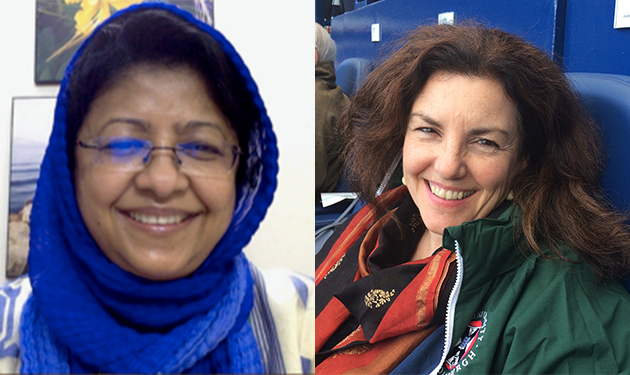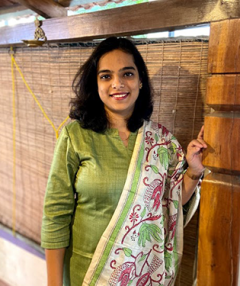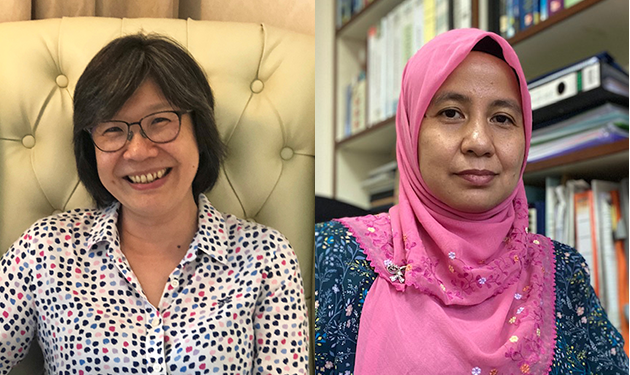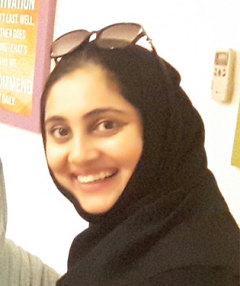International Day of Women and Girls in Science 2021
The theme for 2021’s International Day of Women and Girls in Science on 11 February is Women Scientists at the forefront of the fight against COVID-19
In 2020, RESPIRE launched a programme of work in response to the coronavirus pandemic which aims to build knowledge and inform the global response to COVID-19. The RESPIRE team are recognising some of the women Principal and Co-Principal Investigators and others involved in this programme of work.
Dr Farzana Khan and Professor Liz Grant

Dr Farzana Khan and Professor Liz Grant are co- principal investigators on a RESPIRE COVID-19 project exploring the personal preparedness and self-protective measures of frontline health care workers (FHCWs) in Cox’s Bazar, Bangladesh. This study is providing essential information on how to establish and implement an effective, and socially and culturally sensitive, protection system for these FHCWs, including doctors, nurses and community health workers.
Dr Farzana Khan is CEO and President of the Fasiuddin Khan Research Foundation (FKRF) in Bangladesh, and affiliated to RESPIRE through the Child Health Research Foundation (CHRF). Professor Liz Grant is Director of the Global Health Academy at the University of Edinburgh.
Exploring personal preparedness and self-protective measures against COVID-19
Rutuja Patil

Rutuja Patil is part of a team carrying out sero-surveillance to identify the prevalence of the SARS-CoV-2 infection in a rural population in India. The study will help to determine the burden of COVID-19 infection at the community level and monitor the trends in transmission of the infection. The findings of this project will help guide the design and provision of appropriate healthcare and containment measures in India, with the potential to inform other low- and middle-income country responses.
Sero-surveillance to monitor transmission in rural Western India
Rutuja is based at the Vadu Rural Health Program, King Edward Memorial Hospital in Pune, India. She is also a RESPIRE PhD student and her study is examining the feasibility of using a teleconsultation facility to manage chronic respiratory diseases in remote rural areas in India. Remote consultations are increasingly relevant when face-to-face consultations with healthcare providers are less possible due to COVID-19 pandemic conditions.
Professor Dr Ee Ming Khoo and Dr Adina Abdullah

Professor Dr Ee Ming Khoo and Dr Adina Abdullah are leading two RESPIRE COVID-19 projects, looking at psychological issues faced by primary care teams in Malaysia, and enabling sustainable implementation of eHealth innovations in response to COVID-19.
The findings from these projects could influence responses in other countries, develop digital health solutions for use by frontline health workers and help to prepare for future unknown pandemics and epidemics.
Both Professor Dr Ee Ming Khoo and Dr Adina Abdullah are based at the University of Malaya, Malaysia
Psychological issues faced by primary care teams in Malaysia
Digital health in response to COVID-19 in low- and middle- income countries
Dr Hana Mahmood

Dr Hana Mahmood is part of a team exploring community perceptions of COVID-19 and public health measures to address the disease in Pakistan. This study will help relevant authorities to develop robust communication mechanisms, facilitating communication of accurate and meaningful information to the public. This means the advice is more likely to be heeded and acted upon. This study will also enable authorities to improve preparedness for any future epidemics.
Community perception on approaches to promote adherence to public health measures
Hana is also involved in a study which is developing and testing a reliable diagnostic tool to detect COVID-19 from chest x-rays. Standard diagnostics for COVID-19 can be prohibitively expensive and are not always an option in low- and middle-income countries. However, the majority of these locations have x-ray machines. This project would accelerate the diagnosis and referral of patients, improving clinical outcomes.
COVID-19 detection from chest X-rays using deep learning
Dr Hana Mahmood is based at Neoventive Solutions, Pakistan. She is also carrying out a PhD within the RESPIRE collaboration, exploring the feasibility of an mHealth based approach to counsel caregivers of children under five by Lady Health Workers on timely care seeking for pneumonia.

